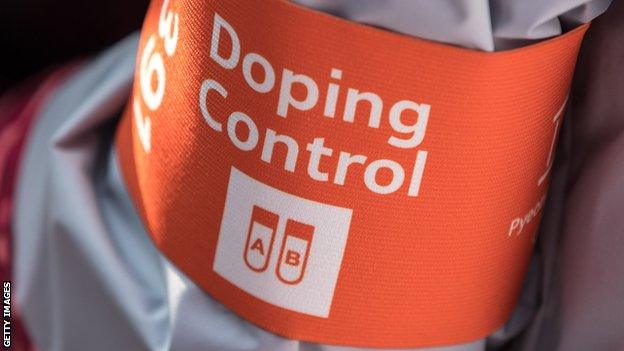Drug testing in sport: How does football compare to other team sports in England?
- Published

Five major domestic leagues did not have a single test conducted in the 12 months between 1 July 2017 and 30 June 2018
Two rugby players from two different codes have been banned from playing in the past two weeks for drugs violations.
A week after Wigan's Gabe Hamlin became the fifth top-flight rugby league player in the past 20 months to be charged with an anti-doping breach, Sale prop Jake Pope became the first player to be found guilty of twice breaching the Rugby Football Union's (RFU) illicit drugs policy.
Banned players from the two rugby codes account for half of all UK Anti-Doping (Ukad) sanctions being served, but how many tests are these athletes exposed to?
BBC Sport looked at the figures covering the 12 months between 1 July 2017 and 30 June 2018 and found:
There has been a 140% increase in the number of tests carried out on Premier League footballers since 2015-16.
Just 10% of all tests carried out by Ukad during that time were done on behalf of the (RFU) and Rugby Football League (RFL).
County Championship cricketers had less than a one-in-six chance of being tested.
Five major domestic leagues did not have a single test conducted.
Rugby codes dominate failed tests list
Ukad, which conducts testing in more than 50 sports, has said its approach to doping control is "intelligence-led", focusing "finite" resources where "greatest public interest and where the main threats to clean sport lie".
Of the 23 athletes to be punished for failing a Ukad drugs test during the time period, six came from samples collected on behalf of the RFL and a further four on behalf of the RFU.
That means 43% of athletes sanctioned fell under the jurisdiction of the RFL and RFU despite the two governing bodies combined accounting for just 10% of all tests carried out.
Figures obtained through a Freedom of Information request showed a total of 288 samples were collected from 528 players to make an appearance in rugby union's Premiership, while 328 samples were collected from 406 players to feature in rugby league's Super League.

Four Super League players - Thomas Minns, Rangi Chase, Zak Hardaker and Adam Walker - tested positive for cocaine during the time period
The RFL said its anti-doping education and testing programme was "comparable to other similar sports when taking into account the number of participants and budgets" and that there will be "an increase in testing over the next two years".
A spokesperson for the RFU, which also runs its own illicit drugs programme, added: "The RFU and everyone involved in rugby take their anti-doping responsibilities seriously through the delivery of a comprehensive, risk-based education and testing programme."
Professor Ivan Waddington, an expert in doping in sport, said both rugby codes are high risk for doping as "the improvements in physical performance associated with drug use are quite substantial".
"There is clearly a case in rugby - both codes - that there should be higher rates of testing," he added.
"For many years now there have been widespread suspicions, supported by drugs-test findings, that drugs use in both rugby codes is not at all unusual."
Football leads the way in anti-doping
The Football Association's (FA) anti-doping programme was by far the most comprehensive of any sport in the UK, with 46% of all tests carried out by Ukad done so on behalf of the FA.
By contrast, cycling and athletics combined only accounted for 12% of tests. However, many individual sports are also covered widely by international agencies, with Ukad's figures for athletics, cycling and swimming subsequently scarce in comparison to football.
When it comes to anti-doping, the FA is understood to outspend every other team sport's governing body by millions of pounds, with each individual drugs test thought to cost between £700 and £1,000.
Since 2015-16, there has been a 140% increase in the number of tests carried out on Premier League players and a 96% rise across the English Football League - something the EFL said it "welcomes".
In the top flight, 1,923 samples were taken from 515 players who made at least one appearance during 2017-18 - an average of 3.73 samples per player.
Jenni Kennedy, the FA's head of integrity, told BBC Sport it "operates one of the most comprehensive national anti-doping programmes in the world".
She added: "Although incidents of doping in English football are very rare, it remains a priority for the FA to find and sanction anyone found taking performance-enhancing or recreational drugs."
In total, 4,495 samples were collected on behalf of the FA without a single failed test in that time - although Peterborough United defender Josh Yorwerth has since been given a four-year ban for evading a test.
Testing in cricket dwarfed by football
Premier League footballers were 20 times more likely to be drugs tested by Ukad during the 2017-18 season than top-level cricketers in the same period.
Just 38 samples were collected from the 208 cricketers who made at least one appearance in Division One of the County Championship, while 32 samples were collected from the 250 players to feature in Division Two.
The England and Wales Cricket Board (ECB) said it takes anti-doping "very seriously" and that there had been a 50% rise in Ukad testing in 2018 compared to the previous year, with a particular focus on the T20 Blast.
It added that "working alongside the Professional Cricketers' Association" it also "tests every player in the first-class counties, Women's Super League and national teams twice a season for recreational drugs" as part of an in-house programme.
In October 2017, Durham batsman Jack Burnham was banned for a year after failing an ECB test.
Which sports didn't test at all?
Five top-level leagues were found not to have carried out a single drugs test, including the fully professional Elite Ice Hockey League, which describes itself as the "third largest winter spectator sport in the UK".
All but one side attracted an average attendance of more than 1,000 during the 2017-18 season, with Nottingham Panthers' average of 5,674 more than 29 clubs competing in the EFL.
The Elite Ice Hockey League said testing had been carried out by Ukad during the recently concluded 2018-19 campaign and that "fans can have confidence in the integrity of our sport".

Elite Ice Hockey League players will come up against Canada and the United States at the 2019 World Championships after Great Britain won promotion to the top division last year
The British Basketball League, the highest tier of the professional game in the UK, also did not carry out any tests.
The BBL said it was "guided by Ukad's experts regarding the frequency and nature of their testing programme" and that it had "not received any recommendations from Ukad regarding a programme of testing that should be implemented".
Three top-level women's leagues - netball's Superleague, rugby union's Premier 15s and rugby league's Women's Super League - also returned zero samples during the time period.
Publicly funded testing is 'inadequate'
While some governing bodies, such as the FA, RFU and ECB, put money towards drugs testing, many sports rely solely on Ukad's publicly funded programmes.
"I'm astonished that so many team sports at that level have drugs testing programmes that at best are woefully inadequate and at worst virtually non-existent," said Waddington, who conducted initial research into the level of drugs testing in football on behalf of the BBC in 2003.
In response to questions about testing in women's sport and general rates of testing across major team sports in England, Ukad said it runs a "comprehensive risk assessment process" in order to allocate resources for publicly funded testing.
"We look into a number of factors - the physiological risk of doping within the sport is one of the key drivers, as is the profile," said Ukad's deputy director of operations Hamish Coffey. "Where a sport has large financial incentives, it has an impact on the level of testing."
'The system is imperfect'
In January 2018, Ukad was awarded an extra £6.1m by the government over two years, which Coffey said has created an "opportunity to expand".
"While we have to prioritise based on risk, there is a risk across all sport and we have to recognise that," he added.
A spokesperson for the Digital, Culture, Media and Sport committee said Ukad is "one of the best supported national anti-doping organisations in the world".
But Dr Paul Dimeo, an anti-doping expert at the University of Stirling, said Ukad needs even more money if it is "to be relied upon".
"A lot ground has to be covered and there are not enough pounds and pennies to go around," said Dimeo. "What happens to the smaller sports, the less well-resourced sports or the sports that don't have a huge inclination to do this sort of work?
"The whole system is imperfect because it is a limited number of tests and so few people get caught that I can't imagine it is working very well or is very effective."